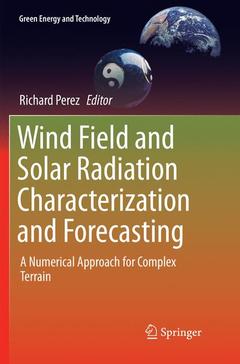Description
Wind Field and Solar Radiation Characterization and Forecasting, Softcover reprint of the original 1st ed. 2018
A Numerical Approach for Complex Terrain
Green Energy and Technology Series
Language: English
Subjects for Wind Field and Solar Radiation Characterization and...:
Wind Field and Solar Radiation Characterization and Forecasting
Publication date: 01-2019
Support: Print on demand
Publication date: 01-2019
Support: Print on demand
Wind Field and Solar Radiation Characterization and Forecasting
Publication date: 05-2018
Support: Print on demand
Publication date: 05-2018
Support: Print on demand
Description
/li>Contents
/li>Biography
/li>Comment
/li>
In addition to describing core concepts and principles, this book reveals professional methodologies and tools used by national agencies and private corporations to predict sites? potential for wind and solar power generation. Each chapter focuses on a different issue, showing readers the corresponding methodology, as well as examples of how to apply the techniques described. These techniques are explained with step-by-step guides that demonstrate how environmental variables in complex terrains can be characterized and forecasted.
The authors present an adaptive finite element mass-consistent model, which computes a diagnostic wind field in the three-dimensional area of interest using observed wind data from measurement stations ? data which is then interpolated using a physical model of the wind field in the boundary layer. An ensemble method is presented based on the perturbation of the numerical weather prediction models? results.
The book goes on to explain solar radiation characterization and forecasting. Solar radiation and electrical power generation temporal and spatial variability are discussed and modelled. Different statistical methods are presented in order to improve solar radiation forecasting using ground measurement, numerical weather predictions (NWPs) and satellite-derived data. This book is focused on both probabilistic and point forecast explaining different models and methodologies to improve the forecasting. The results obtained from various simulations around the world are presented in tables. Finally, the book explains a possible methodology to develop a Solar Map taking into account solar radiation, terrain surface conditions and cast shadows.
As such, the book provides an overview of the concepts, principles and practices involved in the treatment of environmental variables related to solar radiation or wind fields, especially when complex terrains are involved, offering useful resources for students and researchers alike. It also equips professionals with the methodologies and tools needed to construct environmental variable maps and conduct forecasting for solar radiation and wind fields.
Part I: Analysis and Characterization of Geographical and Meteorological Data.- I: Acquisition and Analysis of Meteorological Data.- II: Characterization of Geographical and Meteorological Parameters.- III: Discretization of the Region of Interest.- Part II: Wind Field Diagnostic and Forecasting.- IV: Wind Field Diagnostic Model.- V: Wind Field Deterministic Forecasting.- VI: Wind Field Probabilistic Forecasting.- Part III: Solar Radiation Diagnostic and Forecasting.- VII: Solar Radiation Spatio-Temporal Analysis.- VIII: Solar Radiation Deterministic Forecasting.- IX: Solar Radiation Probabilistic Forecasting.- X: Solar Radiation Maps.- Index.
Richard Pérez directs solar energy research at U. Albany’s Atmospheric Sciences Research Center. He sits on the Advisory Board of George Washington University’s Solar Institute and has served multiple terms on the board of the American Solar Energy Society and as an associate editor of Solar Energy Journal. He has produced over 250 journal articles, book chapters and conference papers.
Gives readers the tools needed to analyze and predict the potential of sites for both wind and solar power generation
Includes wind-field analysis and forecasting
Introduces a method for generating 3D geographical maps with both wind fields and solar radiation forecasting
© 2024 LAVOISIER S.A.S.




